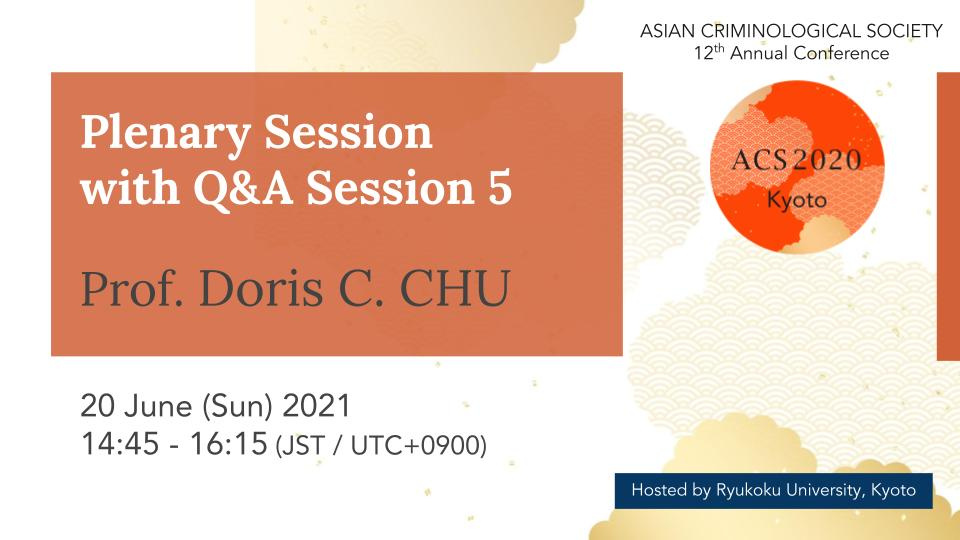2021.08.06
[Report of the ACS2020] Plenary Session with Q&A Session_Prof. Doris C. Chu
The Application of Positive Psychology Intervention to Female Inmates’ Rehabilitation Program
The Asian Criminological Society 12th Annual Conference (ACS2020), hosted by Ryukoku University, was held online for four days from June 18 to 21, 2021. The purpose of the conference, the second of its kind to be held in Japan after the 2014 Osaka conference, was to promote the growth of criminology in Asia and Oceania, and to promote academic exchange with advanced regions of criminology such as the United States and Europe.
>> ACS2020 Program https://acs2020.org/program.html
The overall theme of the conference is "Crime and Punishment under Asian Cultures: Tradition and Innovation in Criminology". The aim was to promote understanding of the social systems and culture and measures against crime and delinquency in Japan, which is said to be "the country with the least crime in the world".
The following is a summary of the Plenary Session with Q&A Session, which was held live streaming at the conference.
- Plenary Speaker: Doris C. Chu (Professor, Department of Criminology, National Chung Cheng University, Taiwan)
- Chair: Mari Hirayama (Professor, Faculty of Law, Hakuoh University, Japan)
- Date: 14:45-16:15, 20 June, 2021
- Keywords: positive psychology; intervention; resilience; substance abuse treatment; hope; empowerment


Doris C. Chu (Professor, Department of Criminology, National Chung Cheng University, Taiwan)
Negative emotions, stress, and the lack of positive stress-coping skills have been found to be related to illicit drug use and relapse. Empirical studies reveal that the elements in positive psychology interventions—e.g., recalling three good things per day, and developing self-strength and self-efficacy—can enhance one’s mental health and resiliency. In recent years, clinicians and researchers have started to incorporate positive psychology principles into treatment programs to help rehabilitate ex-offenders and ex-drug users.
The application of positive psychology and related concepts (e.g., mindfulness, Yoga, and good-life model) to substance abuse treatment and offender rehabilitation is still in its initial stages. Systematic studies with longitudinal data are not sufficient. Most of the existing studies have been conducted in Western countries, and empirical studies in Asian countries are rare.
In this presentation, I will share with you an empirical study that examined the outcomes of a strength-based positive psychology intervention for female inmates with drug offenses in Taiwan. A quasi-experimental intervention design was adopted in this empirical study. Participants in the experimental (intervention) group consisted of a sample of 61 female inmates in a women prison in Taiwan. The comparison group consisted of a sample of 60 female inmates with matched characteristics (age, length of imprisonment, history of prior criminal records) in the same prison. Female inmates assigned to the experimental group participated in a 6-session intervention. The six-sessions included optimism (three good things a day) and being hopeful; visualizing best self (identifying and applying signature strengths); being kind to others and showing gratitude; building goals; relaxation (Seligman et al., 2005; Lewis, 2007; Papazoglou & Andersen, 2014; Huynh et al., 2015), emotion regulation, resilience, and empowerment. Pre-and post-intervention surveys were conducted to examine the effects of the intervention. It was found that inmates who completed the six sessions intervention had significantly higher scores in the dimensions of personal growth, empowerment, and mindful attention awareness, compared to the female inmates in the control group.
This study, of benefit to criminal justice agencies and practitioners, offers empirical evidence about the effects of positive psychology interventions on promoting the wellbeing of incarcerated women. Findings of the research can suggest courses and strategies that might be included in treatment programs for women during incarceration.
Summary of the Q&A Session
Question 1: Your report focuses on female prisoners charged with drug-related crimes, which are so-called "victimless crimes." What kind of effects can we expect from this Strength-Based Psychology intervention for crimes with victims, not drug-related crimes? What is the relationship between making amends to the victim and correctional education that is conscious of the victim's perspective?
Answer 1: While it is true that the female prisoners in my report are "drug offenders" in both the experimental and control groups, some of them have committed other crimes in addition to drug offenses. Some of them committed other crimes as a means of obtaining illegal drugs. For those who committed fraud or violent crimes, it is true that empathy for the victims is important. However, I believe that the main aspects of Strength-Based Psychology interventions can be applied to these crimes as well.
Question 2: The importance of Strength-Based Psychology interventions in penal institutions is as you reported. On the other hand, are there any plans to apply this approach to follow-up studies after prisoners are released from prison? How about investigating the impact on the rate of reimprisoned inmates?
Answer 2: Of course, it would be nice to be able to study the effects of the Strength-Based Psychology interventions even after the prisoners are released. However, there are some barriers to this kind of study. For example, access to information on ex-prisoners after their release is quite limited. There is a strong need for confidentiality of information on ex-prisoners. It should also be pointed out that the prisoners are serving long sentences. (It takes a long time for them to return to society.)
As a further area of application of this study, the effects on male prisoners should also be considered. However, we recognize that the degree of engagement in the program is higher for women than for boys, and that the effects are also higher.
We also believe that this approach has a role to play in the training of police officers and prison guards.
Question 3: Could it be that the Strength-Based Psychology interventions could also be expected to change prison culture - especially a culture that has been far too male-oriented?
Answer 3: That's right. The implementation of such programs in penal institutions may create a more relaxed atmosphere within the penal institutions themselves. In Taiwan's female prisons, it can be said that more effective correctional education programs are being implemented in the classroom, and more women are becoming correctional officers.
Question 4: Please explain a little more about the changes in prison culture in Taiwan. In particular, have you begun to see the perspective of "open prisons"? For example, is there an external ombudsman organization like the Penal Institution Visiting Committee in Japan, or is there a movement of outreach from penal institutions to the local community?
Answer 4: Recent legal reforms have led to the establishment of oversight committees organized by those outside penal institutions. Based on the complaints and suggestions of prisoners, the committee makes recommendations for the improvement of penal institutions.
Question 5: In Taiwan, what kinds of initiatives, both government-led and by private organizations, are available to help prisoners reintegrate into society after their release?
Answer 5: Especially in recent years, the government has begun to realize the importance of social networks after release from prison. There is also an emphasis on efforts to support the bonds between prisoners and their families. I hope to see more and more interventions based on these ideas in the future.